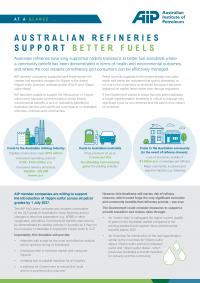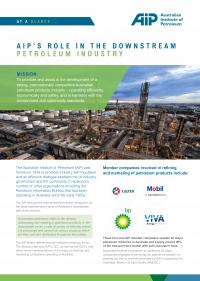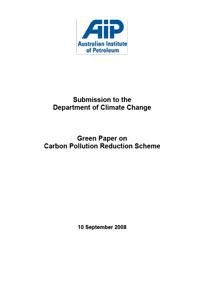Resources

Date
Description
Australian refineries have long supported orderly transitions to better fuel standards where a community benefit has been demonstrated in terms of health and environmental outcomes, and where the cost impacts on refineries and consumers can be effectively managed.
Date
Description
The Australian Institute of Petroleum (AIP) was formed in 1976 to promote industry self-regulation and an effective dialogue between the oil industry, government and the community. It replaced a number of other organisations including the Petroleum Information Bureau that had been operating in…
Date
Description
AIP and its member companies actively participate in public consultation processes on climate change. For example, AIP and its member companies are participating in the process of public consultation on national climate change policy development, including on the range of issues associated with…Date
Description
There is an extensive range of Federal, State/Territory and Local government regulations and legislation applying to refineries and businesses operating in the downstream petroleum industry. Some of the key regulations are outlined below. Formal Price Monitoring On 17 December 2007, under…Date
Description
AIP member companies provide very reliable supplies of fuel to the Australian market and: represent around 90% of primary fuel supply to the Australian market, have decades of operational experience in Australia and Asia delivering high quality fuel to customers, have major…Date
Description
Transport fuel imports do not increase risk for supply reliability and security A diversity of global supply sources and local import facilities provide a range of options for Australia. Australia is already dependent on imports to meet the growth in demand for transport fuels (eg. demand…Date
Description
Relying on shipping (for imports) does not increase security risks, and shipping lanes are not easily disrupted. Most countries are reliant on movements of petroleum (crude and product) within and between countries, and particularly so for Australia (in both an export and import sense).…Date
Description
Through submissions to review processes, AIP aims to inform the community about the downstream petroleum industry, and its significance to the national economy, by making available comprehensive factual information and data about the industry and its performance over time. AIP material also…Date
Description
Australian refineries continue to operate with no indications of any plans to close the remaining four There have been statements and Inquiry submissions from all refining companies about their future refinery investment plans and the ongoing role of these facilities in meeting customer…Date
Description
Self-sufficiency in transport fuels is not necessary for supply security Security of supply is the result of resilient and efficient supply chains and robust risk management – it is not about self-sufficiency or independence from markets. There are 3 critical elements of any strategy to…